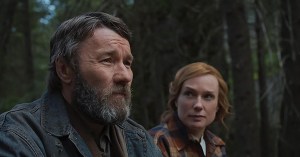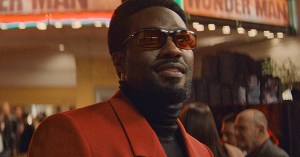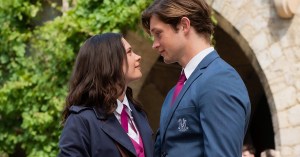Five Favorite Films with M. Night Shyamalan
M. Night Shyamalan’s latest film, After Earth, is a movie about finding the essence of your power in the face of great adversity. My feelings about my interview with the director seemed similar to those of Jaden Smith as he exited his grounded ship in the film, not knowing what lurked outside, but not having the luxury of letting it stop him, either. Would an interview with M. Night Shyamalan require a decoder ring? An encyclopedia? A tranquilizer dart?
As it turns out, I didn’t face anything like what Jaden’s character faces in the film. All I had to do was introduce myself and mention to Shyamalan that I know exactly where I was and who I was with when I saw all of his movies from 1999 on. His excited response was how special that was, and how he thinks of movies that way, too. He knows that he saw Back to the Future on the Jersey Shore while he was wearing a black sweatshirt (note: the twist being that the guy was the one to remember what he was wearing when he saw important movies).
Once we established a bond over crystal-clear recollections of transformative cinematic experiences, he began to lament only being able to pick five films. He decided to start with the ones that hang on the wall of his office and go from there. Here are M. Night Shyamalan’s Five Favorite Films:
The Godfather (Francis Ford Coppola, 1972; 100% Tomatometer)
Favorite movie of all time, what I think is the best crafted movie of all time, is The Godfather. It was the perfect confluence of the source material being so intimate and true, and having within its DNA, it just so happens, is an incredible plot in the most organic matter. It is so not contrived, or “your IQ’s dropping,” which is almost the case of all other combinations, right? In this one, it’s inherently built into the life of these people. And there are stakes, there’s threat, and that’s just built in, so the source material had all of that. And the confluence of one of the great artists of his time for sure in Coppola, the great kind of forward thinking artists, and a leader in — he was a cult figure for artists that followed him for a long time. I got to meet him a couple times, and I feel the same way, if I was born on that time, I would have been on his ashram for sure. He’s coming from such philosophy, and depth about art, and this guy was kind of forced to do something with a hair more structure and a hair more chance of connection to people than he would normally want. He used all those tools of artistry and introspection and craft — he has an incredible handle on the world and a pushing of the envelope to bring depth and humanity to it, which makes it a perfect combination of everything.
Jaws (Steven Spielberg, 1975; 100% Tomatometer)
Jaws is the next poster on my wall, I’m staring at it right now. You are about to be introduced to, in my opinion, the greatest craftsman storyteller the cinema has ever seen and with a vehicle that had literally the perfect balance — and he brought that. It was [Steven Spielberg’s] balance of humor and artistry and the genre. It was the culminating of that balance. I screened that movie for my crew — I forgot which movie, two or three movies ago, and it’s just incredible to watch the balancing act of the humor. Roy Schieder’s trying to understand about what’s going on in the town about the shark and there’s this lady complaining to him about the kids that are karate chopping the fence. It’s genius because life moves on, and this is like real life. It’s the collision of a perfect story from the book with great sensibilities for entertainment and humor. Spielberg gets the precision of the craft and thinking about the shot with the me lieu of the time, and does in that docu-1970s style, which is my favorite time period in cinema ever.
The Exorcist (William Friedkin, 1973; 87% Tomatometer)
These are all based on books, right? And the most amazing source material, tonal source material. The Exorcist has, again, a collision of the time period with that style of cinema, but Friedkin’s kind of unlike the previous two. They did a bunch of ad-libby stuff, but The Exorcist was the most with regard to that contemporaneous kind of shooting. The story is about a reality-based story about the Devil, done at a time when docu-style was predominant, and it felt really natural. Friedkin spent an enormous amount of time shooting the movie and did it with reverence, and the structure is perfect. It starts in the Middle East, goes to a Georgetown bedroom, and gets smaller and smaller until you meet a side character, the second priest. The plot is this incredible kind of twisty thing, and then he ends up sacrificing himself. It’s awesome.
Being There (Hal Ashby, 1979; 95% Tomatometer)
Was this a comedy, straight drama, fantasy? I don’t know. It’s so incredible. This has one of my favorite endings to a movie, just incredible. When he walked on the water my jaw dropped, I just freaked out, freaked out, that we were making fun of him the whole time, we thought he was an idiot the whole time, thought he was like this mentally handicapped person, and all he was was simple. The things that were happening, and the people that were following him, and the potential future for him, makes sense when you just turn your perspective that way. Bold, bold, bold genre-breaking filmmaking, and will always be kind of a beacon of originality for me.
Rebecca (Alfred Hitchcock, 1940; 100% Tomatometer)
Also based on a book. Coming from a super, super anal place as a filmmaker, the idea that the greatest hands-on auteur [Alfred Hitchcock] in cinema history made a movie with his hand buried in there perfectly–a lot of his movies, his hand is on top, and in this one, his hand was buried perfectly in there. Again, I’m not sure what genre it is and I love it because of that. Is it scary? I’m not sure it is. Is it a drama? For sure. Is it a romance? Yeah. And I love it, so elegantly done, I so fell in love with those characters, the performances were amazing. It was epic and haunting, and it was just its own perfect little gem that will never be re-created.
After Earth is in theaters now.






